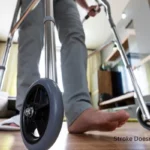I don’t remember the exact second it happened, but I can still picture the moment I realized something was completely out of place in my own body.
It wasn’t dramatic. No sirens, no sudden collapse worthy of a film scene. Just a normal morning that decided to rewrite my life’s script without asking permission. One moment, routine unfolded like it always had. Next, an uninvited presence stepped in—silent, relentless, reshaping thoughts as though it had always belonged.
In those first weeks, I refused to name it. I called it “That Thing,” hoping vagueness might make it less real. Speaking its true name felt monumental, too definitive, as if uttering it aloud would cement it into every corner of existence.
Months passed, and this unexpected chapter began to develop its own language. It seeped into conversations like weather—present, unannounced, unavoidable. Phrases started slipping out naturally:
“Oh, my balance is off again today. Must be that thing.”
“Can’t recall that word… brain’s running on its own schedule.”
“Stairs are slower now. That’s just how it goes.”
Comments like these aren’t made for laughs. Humor acts as armor, a makeshift life jacket in moments when sinking feels imminent. Finding a way to laugh—even briefly—keeps a sense of stability afloat.
No one ever prepares for change of this scale. One day, life moves at a familiar pace; next, it demands an entirely new rhythm and asks for patience that feels unfamiliar. No one would choose this path willingly, yet survival often begins with one small smile, even when it’s held tightly behind clenched teeth.
Morning with Stroke
Mornings now follow a completely different rhythm for me — slower, intentional, and nothing like what I once knew. Before, I would jump up as soon as my eyes opened, guided by routine and desire for that first cup of coffee. It almost felt comical how I’d launch into day, like someone racing toward a familiar, comforting scent.
Now, mornings feel more like easing into a cold lake, one careful step at a time. Eyes open, and instead of leaping upright, I pause. Mind and limbs hold an early-morning council, two partners negotiating how day should begin. Some mornings, both are aligned, ready to move. Others, they clash — mind urging forward, limbs insisting on patience.
I’ve learned to honor that process. Sitting at edge of bed, breathing slows, balance checks in. On heavier mornings, resistance reveals itself before feet even touch floor, as if air thickened and each step demands wading through invisible water. Every motion carries a weight of intention, a slower rhythm that must be respected.
Small, hard-earned victories have taken on new significance. Sliding on both socks without tipping over feels like winning a trophy. Carrying freshly brewed coffee across kitchen without spilling feels like an Olympic feat. Old habits never noticed these moments. New me wants to hang streamers, cheer aloud, celebrate milestones that once seemed mundane — because in their own way, they truly are.
Social Side of Recovery Conversations
It’s always fascinating to watch reactions when I mention what I’ve been through. There’s a brief pause—barely a heartbeat—where you can almost see gears grinding behind their eyes. Eyebrows lift, eyes narrow slightly, and for a fraction of a second, uncertainty hovers, like they’ve just heard something that doesn’t quite fit any script they know. Some tilt their head, like a friend admitting to wrestling alligators on weekends.
Then comes verbal tiptoeing:
“Oh… wow. You look… good?”
Words come out like a sentence being tested before commitment, that upward lilt carrying surprise and hesitation. I nod politely, but inside, I’m thinking, Is that meant to reassure me, or you?
From there, conversations tend to branch into three familiar directions. Some people lean forward, fully engaged, asking for every detail—when it began, how it unfolded, what daily life looks like now. They want full picture, every turn along way.
Others pull back instead. Words fade, gazes drop to chairs or tabletops, and silence stretches out, tight and uncomfortable, like a rope drawn too far.
Then there’s a third group: storytellers. They immediately dig through memory, surfacing stories about a cousin, a neighbor, or a friend who “went through same thing” and somehow ended up running marathons, climbing mountains, or smashing personal records.
I never quite know how to take that. Is it inspiration? Subtle competition? Or simply an attempt to connect?
One thing is certain: no two journeys through life-changing events are alike. Mine is a patchwork of highs and lows, each carrying its own weight. Some days, I feel unstoppable—mind and limbs in sync, surprised by what I can accomplish. Other days, tasks as simple as washing and folding laundry feel like planting a flag atop a distant summit. Each moment holds its own quiet victory.
Brain Fog, My Old Frenemy
Good Days vs. Bad Days
Here’s something I never fully understood before going through this ordeal — recovery doesn’t follow a neat, predictable path. It’s more like watching a tipsy squirrel try to cross a telephone wire: wobbly, unpredictable, and sometimes a little ridiculous. Some mornings, I wake up feeling like a lead in an inspiring comeback film, ready to take on anything. Other mornings, it feels as if production got pulled halfway through.
Rough patches used to flatten me, leaving frustration and defeat in their wake. Over time, I realized they’re simply part of a rhythm — not failure, just a chapter. To keep myself going, I started keeping a “good things” list on my phone for moments when I need a lift. It’s filled with little victories, such as:
Walking to mailbox without using a cane.
Remembering a neighbor’s name without peeking at social media.
Making it through grocery store without needing to pause and catch breath.
They may seem small to anyone else, but for me, each one is a hard-earned win — and I’ll celebrate every single one.
Family Stroke Talk
If you want to see how solid relationships really are, experience a life event that shakes everything familiar. It’s like picking up a snow globe and giving it a hard shake — everything inside swirls in chaos. People who truly love you rush toward center, trying to hold you steady. Others… stay on outer edges, still and unmoved, like decorative pieces gathering dust.
When my world tilted, family had to meet a new version of me. Someone who once juggled ten tasks at once, remembered every detail, and moved with confidence. Now, I’m slower. Each step requires thought. Some tasks need an extra hand, ones I used to complete without even looking. That part isn’t easy — for me or for them. Yet, beneath these changes, resilience has grown stronger than ever.
We’ve developed our own language for this chapter. A shorthand born from shared moments, trial and error, and patience:
“Need a reset?” signals buzzing thoughts, fading focus, and a need to step away before overwhelm takes over.
“Time to recharge” means retreating to a quiet corner, closing eyes, letting life continue without me for a while.
“That’s a tomorrow job” is a gentle agreement that a task isn’t worth burning out today — it can wait and will still be there later.
What began as practical communication has deepened. These phrases are more than words; they’re reminders that I’m surrounded by people who understand, who don’t require explanations of every struggle because they’ve been present through it all.
Public Adventures
I used to dart into stores without a second thought — a “grab it and go” kind of approach. Errands were quick pit stops, just another box on a busy to-do list. Now, even a short trip requires strategy. I start by picking shoes with sturdy grip so each step feels secure. Then comes a mental check-in: do I have focus and energy for this outing? Are aisles wide enough? Will crowds make movement tricky? I’ve learned that rushing only increases chances of an awkward stumble or sudden freeze in a walkway.
It’s not about unease around people — far from it. It’s more about unpredictable movement. A packed aisle can throw off rhythm, and when that happens, a pause becomes necessary. Standing still amid a busy store can feel like spotlighted exposure, yet most people are more understanding than I once believed.
Every successful trip now feels like a quiet victory. It’s not only about buying milk or bread; it’s proof that I can navigate start to finish. Each time I leave with everything on my list — without incident — I feel stronger, braver. Strangers have offered assistance more than once, reaching for items on high shelves, carrying heavy bags, or simply sharing a friendly nod as we pass. Those small gestures linger. They remind me that people notice more than expected, and kindness often arrives exactly when it’s needed.
Learning a New Pace
Before life took an unexpected turn, I moved as if someone hit fast-forward and snapped off switch. Everything centered on racing from one moment into next. Mornings smeared together—alarm blasting, feet meeting floor, coffee poured without tasting it, then straight into jam-packed day. No pause existed to notice air brushing skin or sunrise washing sky in pink or gold. Living felt like riding an endless conveyor belt locked into one setting: fast.
Now, that conveyor belt has been replaced by a quiet, winding path. Tempo has shifted completely. Days aren’t about racing to next checkpoint; each moment is allowed to take full shape before moving on. I wake gently, letting limbs settle before standing. Minutes aren’t counted, and clock is no longer chased.
Change has opened eyes to things once ignored. In kitchen, sunlight spilling across counter draws attention, bright streaks shifting slowly as morning unfolds. Texture of couch becomes a point of focus — weave of fabric, gentle give under weight, faint scent of softener lingering from last wash. In stillness of quiet room, breathing becomes a metronome, steady and grounding, a reminder that I’m here, present.
This new pace isn’t only about slowing down; it’s about deepening awareness. Life no longer feels like a checklist of tasks but a series of moments to inhabit fully. Presence has emerged as a kind of strength — not only in easier times, but especially when days feel heavy. Even on tougher mornings, noticing a small sliver of beauty in middle of it all carries power.
Laughing Through It
Without laughter, I think I’d unravel completely.
I still remember one moment at dinner when I meant to ask, “Can you pass the pepper?” but what came out was, “Can you pat the puppy?” For half a second, everyone went completely still—then laughter burst out, loud and unstoppable. Another time, I stepped onto a porch, misjudged height, and turned it into an awkward little dance that I couldn’t repeat even if I tried.
I choose laughter because tears drain too quickly. I laugh because sometimes humor arrives honestly, unplanned and bright. Most of all, I laugh because it feels like my way of fighting back — of gripping tightly to fragments of myself that an uninvited event once tried to claim.
Looking Ahead
I can’t predict exactly what lies ahead, but one thing is certain — I’m still standing. One foot moves in front of another, figuring things out, discovering new ways to live within this version of reality. Conversations, adjustments, small victories — all of it matters.
I don’t dress it up to make it seem easier than it is. Some stretches feel heavy, and certain moments are downright rough. Yet, woven through those challenges are genuine happiness, meaningful connections with others, and a strange but comforting calm that comes from reaching an edge and finding strength to return.




